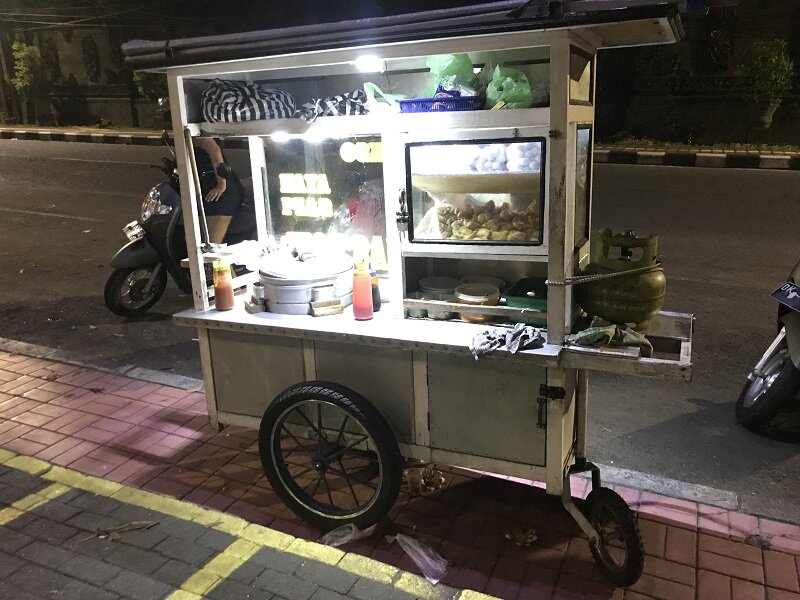In Bakso We Trust
Author photo.
Bakso is something of a national institution in Indonesia. It just means meatball, but there’s more to it than that and these little mobile bakso sellers are ubiquitous throughout the archipelago. It is exactly what you think it is - a can of propane, a bubbling pot of stock, some meatballs and noodles, and various condiments all mounted on a wheeled cart. In truth there is nothing particularly amazing about the taste - but there are few culinary artifacts as deeply embedded in Indonesian culture as the humble bakso seller.
There are of course many chain restaurants that sell bakso in mall food courts and such, but the best bowl of bakso is obtained on the street from a vendor parked on a curb somewhere. Bakso sellers can also be found rolling their carts up and down the street, often tapping a wooden spoon so you know when they’re coming, like the ice cream truck in America. More than once my wife has sent me running down the street after the bakso man when she heard him tapping. It’s cheap and fast and there is a communal aspect to the shared experience of sitting on the curb next to a bunch of strangers asking them to pass the sambal.
Bakso are made with tapioca flour so they are a bit dense and chewy. And there are some creative variations on the theme. Bakso are typically small and bite-sized, but some can be quite large while others have an entire egg or spicy sambal on the inside. A simple bowl of bakso is also endlessly customizable - the seller will provide vinegar, kecap manis, fried shallots and a jug of pureed chilies for you to add to your bowl in whatever way seems best to you.
When COVID-19 hit, I was concerned with how local bakso sellers would deal with it. Like millions of people in Indonesia, bakso sellers are part of the informal economy. As street vendors they don’t pay taxes on their earnings; in fact they are not really regulated in any meaningful or structured way at all, as far as I know. But this also means they don’t have access to any kind of unemployment insurance or social safety net from the state during hard times. And what could be harder for street vendors than a global pandemic forcing people to stay off the streets?
This is one reason why Bali, and many other parts of the world with large informal sectors and constrained fiscal resources, has chosen not to pursue a strict lockdown. The bakso sellers, the jamu ladies, and all the other informal sector workers need to be able to keep earning a living. I am glad to report that my favorite bakso, Mas Doel, has been open and selling throughout this crisis over near Pasar Badung. This bakso is especially nice because you get a variety of stuff - not just meatballs, but different kinds of dumplings and tofu, which adds a variety of textures and flavors. One bowl is 13,000 rupiah or less than 1 dollar. It’s not as crowded as it was before COVID-19, but still doing a brisk business which I am happy to see.
Mas Doel is a little like Tommy’s Burgers in the US - there are a bunch of them all over the place, and they seem to move around from time to time like desert nomads. I don’t know if they are all owned by the same person, or if this is a case of rampant intellectual property theft but in any event every few days or weeks you need to put a little leg work into finding them again. But that’s OK. If not for the mystery of the disappearing reappearing bakso man, what else are we living for?





